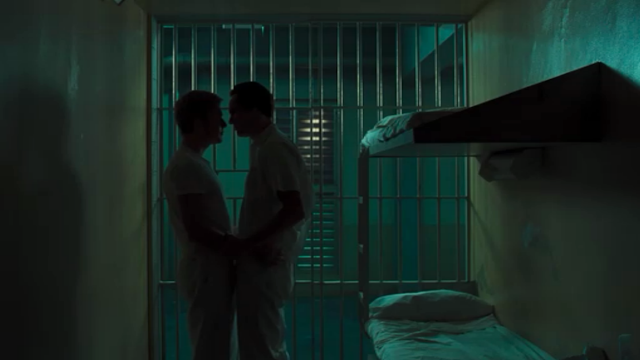Past issues of Icon Magazine have popped up on various blogs, but seeing the autumn 2011 Crystal Reed cover on the popular Just Jared Jr. is most triumphant.
Along with again acting as copy editor, I wrote five of the issue's articles, including intriguing Q&As with award-winning Broadway dancer and "Drop Dead Diva" star Kate Levering and photographer/ex-Playboy Playmate/Paris Hilton BFF Jennifer Rovero, the photographer and fashion designer spotlights on Emily Soto and Kenneth Barlis, respectively, and the cover piece on lovely, bubbly "Teen Wolf" star Crystal Reed, who can be also be seen in "Crazy, Stupid, Love.".
Though I feel most of the pieces are good and it's difficult to select favorites, I particularly recommend the Levering interview as we were able to delve in to the moral base of "Drop Dead Diva" in an interesting way and even discuss a cause the actress is striving to assist in Uganda, and the Kenneth Barlis piece as Barlis is a true up-and-comer - a burgeoning designer with a bridal/evening wear collection available even though he's still in school - and his story from a childhood in the Philippines to unprecedented opportunities in California makes for what I probably consider my best work for Icon yet.
In the Rovero interview, the photographer also known as Camraface discusses the motivation behind her curiously sexy guerrilla style, why her iPhone has become her preferred camera and what titillating subjects she may soon conquer. Emily Soto proves there is no single "correct" path to a dream by describing an unorthodox career shift along with her penchant for outdoor photography. And, of course, if you're a "Teen Wolf" fan or an appreciator of fine young actresses in general, the where'd-she-come-from, where's-she-going Crystal Reed bio will clue you in to the fresh and captivating talent's road to Hollywood (a road that involves "The Dark Knight" in a way you might not see coming), what it's like being a rising star and how things are changing for Allison Argent in the newly-ordered second season of "Wolf".
Other articles include a Karl Lagerfeld retrospective, a k.hendrix showroom highlight, an interview with musician Mark Russell, Alex Taylor's first whack at the Male Perspective column, and DJ Memphis on Air's return to the art of dropping jaws and popping eyeballs with a follow-up to last issue's turn-offs list - "Top Ten Turn-Ons for Men"!
So, yeah, with my involvement in Icon's production having reached a new high, it's pretty darn exciting to see the new issue's cover on a noted gossip blog.
Icon Magazine's first anniversarial autumn 2011 issue will be available - for free, naturally - within the week. As per usual, teasers for articles I was involved with will appear here with links to their full forms on theiconmag.com.
Along with again acting as copy editor, I wrote five of the issue's articles, including intriguing Q&As with award-winning Broadway dancer and "Drop Dead Diva" star Kate Levering and photographer/ex-Playboy Playmate/Paris Hilton BFF Jennifer Rovero, the photographer and fashion designer spotlights on Emily Soto and Kenneth Barlis, respectively, and the cover piece on lovely, bubbly "Teen Wolf" star Crystal Reed, who can be also be seen in "Crazy, Stupid, Love.".
Though I feel most of the pieces are good and it's difficult to select favorites, I particularly recommend the Levering interview as we were able to delve in to the moral base of "Drop Dead Diva" in an interesting way and even discuss a cause the actress is striving to assist in Uganda, and the Kenneth Barlis piece as Barlis is a true up-and-comer - a burgeoning designer with a bridal/evening wear collection available even though he's still in school - and his story from a childhood in the Philippines to unprecedented opportunities in California makes for what I probably consider my best work for Icon yet.
In the Rovero interview, the photographer also known as Camraface discusses the motivation behind her curiously sexy guerrilla style, why her iPhone has become her preferred camera and what titillating subjects she may soon conquer. Emily Soto proves there is no single "correct" path to a dream by describing an unorthodox career shift along with her penchant for outdoor photography. And, of course, if you're a "Teen Wolf" fan or an appreciator of fine young actresses in general, the where'd-she-come-from, where's-she-going Crystal Reed bio will clue you in to the fresh and captivating talent's road to Hollywood (a road that involves "The Dark Knight" in a way you might not see coming), what it's like being a rising star and how things are changing for Allison Argent in the newly-ordered second season of "Wolf".
Other articles include a Karl Lagerfeld retrospective, a k.hendrix showroom highlight, an interview with musician Mark Russell, Alex Taylor's first whack at the Male Perspective column, and DJ Memphis on Air's return to the art of dropping jaws and popping eyeballs with a follow-up to last issue's turn-offs list - "Top Ten Turn-Ons for Men"!
So, yeah, with my involvement in Icon's production having reached a new high, it's pretty darn exciting to see the new issue's cover on a noted gossip blog.
Icon Magazine's first anniversarial autumn 2011 issue will be available - for free, naturally - within the week. As per usual, teasers for articles I was involved with will appear here with links to their full forms on theiconmag.com.

















